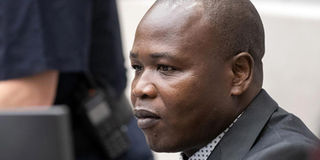Acholi accuses ICC of selective indictment

Dominic Ongwen
What you need to know:
- A cultural official says the atrocities committed during the LRA involved other perpetrators who have not been prosecuted.
Acholi cultural institution has accused the International Criminal Court (ICC) of selective indictment in the two-decade insurgency in northern region.
A representative of the paramount chief, Mr Collins Atiko Muttu, said although the ICC indicted top commanders of the Lord’s Resistance Army (LRA), it left out other perpetrators.
“This war was not only perpetrated by the LRA. There are other participants and perpetrators walking free. Why are some people not indicted? You indict [Omar] al-Bashir [former Sudan president] and other leaders, while others have not been indicted. The atrocities committed were not selective,” Mr Muttu told a meeting in Gulu City on Tuesday.
This was during the closure of the Access to Justice Project that was being implemented by the country office of the ICC, and funded by Denmark.
In 2005, the ICC issued arrest warrants against LRA leader Joseph Kony and four of his top commanders for war crimes and crimes against humanity allegedly committed in northern Uganda.
The charges include murder, rape, sexual enslavement, mutilation and the recruitment of child soldiers.
Those indicted included Vincent Otti, Okot Odhiambo, Raska Lukwiya, who have since died, and Dominic Ongwen (now facing trial at The Hague) .
However, Ms Romina Morello, ICC’s associate external relations and cooperation officer, said the criticism against the court is misplaced, biased, and often incorrect.
Regarding the closure of the Access to Justice project, the ICC said it was meant to last only two years but delayed due to the Covid-19 pandemic.
“We do not have the possibility of continuing with it because it was a two-year project; there is no indication that the Embassy [of Denmark] is going to continue funding the project. This does not mean we are going to stop outreach activities…We shall continue with the outreach programme every month,” Ms Maria Kamara Mabinty, the ICC outreach officer for Uganda and Kenya, who was at the Gulu meeting, said.
The project was launched in 2017 to increase access to the trial of Ongwen and open spaces for widespread participation of victims, affected communities and different stakeholders across northern Uganda.
ONGWEN CASE
During the closing statements in Dominic Ongwen’s (pictured below) trial in March 2020, the defence team accused the ICC of being misused by the government to pin their client. The team led by Kampala-based lawyer Krispus Ayena Odongo argued that Uganda being a stateparty to the Rome Statute referred only one side to the conflict to ICC. Mr Ayena said the chief prosecutor of The Hague-based court should have gone with an open mind “not with a close mind to investigate only one specific group of people, and should have investigated everywhere.”




